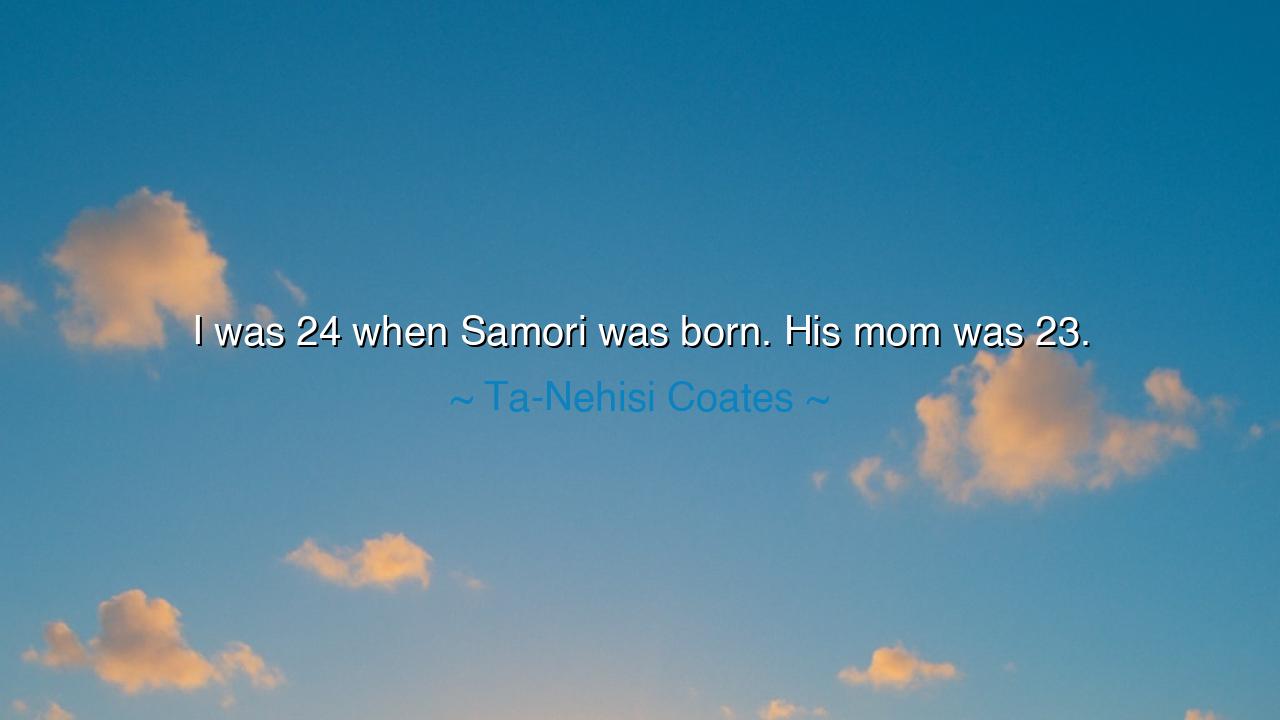
I was 24 when Samori was born. His mom was 23.






When Ta-Nehisi Coates said, “I was 24 when Samori was born. His mom was 23,” his words carried a quiet gravity — a simple statement, yet one that trembles with the weight of time, responsibility, and transformation. Beneath its plainness lies the story of a young man standing at the edge of adulthood, suddenly confronted with the sacred task of parenthood — the duty to nurture, protect, and guide a life newly entrusted to him. It is the moment when youth meets eternity, when one realizes that the world is no longer just one’s own. For in the birth of a child, the past and future converge; and in Coates’s reflection, we hear both awe and remembrance — the voice of a man looking back at the beginning of his greatest education: the education of the heart.
In the manner of the ancients, this sentence would be seen not merely as biographical, but as an invocation of lineage and legacy. Coates names his son Samori, after Samori Touré, the 19th-century West African leader who resisted colonial conquest — a man of courage, conviction, and defiance. Thus, even in the naming, there is meaning. Coates and his partner, still young themselves, placed upon their child a name that carried history, resilience, and pride. Their youth was not a hindrance; it was a fire — an urgency to forge strength and wisdom in the face of a world that often denied it. When Coates says, “I was 24,” he is also saying, I was still learning who I was, even as I was charged to teach another how to live.
The origin of this quote lies in Coates’s memoir and reflections, particularly in his writings about fatherhood and the inheritance of Black identity in America. He speaks of his son not only as his child, but as a mirror of his own journey — a continuation of a struggle both personal and collective. The young father, only 24, had already begun to grapple with the responsibilities of being a man in a country fraught with the weight of history. Through Samori, Coates began to see himself not merely as an individual, but as a link in a chain, stretching backward through generations of struggle and forward into the uncertain light of the future.
In ancient times, this moment — when a man first becomes a father — was seen as a sacred threshold. It was when the warrior became the protector, when the wanderer found purpose in the shelter he built for another. So too did Coates step into that ancient role, carrying forward the wisdom his own father had instilled in him — a father who filled his home with books, history, and the discipline of truth. Yet even with that inheritance, Coates understood the humility of the task before him: to guide a soul through a world that had not yet learned to honor all its children equally. His words echo the feeling of standing before a vast responsibility, armed only with love, hope, and the will to try.
There is a lesson in his reflection that speaks across time: youth does not disqualify one from wisdom; responsibility gives birth to it. Many of the great figures of history began their journeys when they were scarcely older than Coates was when Samori came into the world. Alexander the Great was not yet 25 when he began his conquests; Joan of Arc was younger still when she led armies in defense of her faith. Yet their strength, like Coates’s, did not come from age — it came from purpose. The arrival of his son forced Coates to step into the fullness of himself, to live not merely as a dreamer, but as a builder of reality. Parenthood, then, became his crucible — the place where idealism met endurance, and where love demanded action.
Yet beneath the heroism of responsibility lies something tender and universal — the realization that to raise a child is to begin again. In watching his son take his first steps, Coates was reminded of his own — of the fragility and wonder of life. He saw in Samori both his past and his possibility. The world he sought to understand as a writer, he now saw through the eyes of a child. Thus, the birth of his son did not end his questioning; it deepened it. He began to write not only for himself, but for the generation that would follow, for the child who would inherit both the world’s beauty and its cruelty.
So, dear listener, take this truth as your own: responsibility is not a burden — it is a calling. Whether it comes in the form of a child, a craft, or a cause, it demands that you rise above what you were and become what you are meant to be. Youth does not excuse one from purpose; rather, purpose refines youth into maturity. If you find yourself afraid, as all new parents and creators are, remember Coates’s example: begin anyway. Speak names that carry power. Live with courage enough to protect, wisdom enough to teach, and humility enough to learn.
For as Ta-Nehisi Coates reminds us, the true measure of a life is not in how long we wait to begin it, but in how deeply we live once we do. To hold a child — or a dream — in one’s hands is to hold the future itself. And though we may begin young and uncertain, it is through love, not perfection, that we become worthy of the task.






AAdministratorAdministrator
Welcome, honored guests. Please leave a comment, we will respond soon